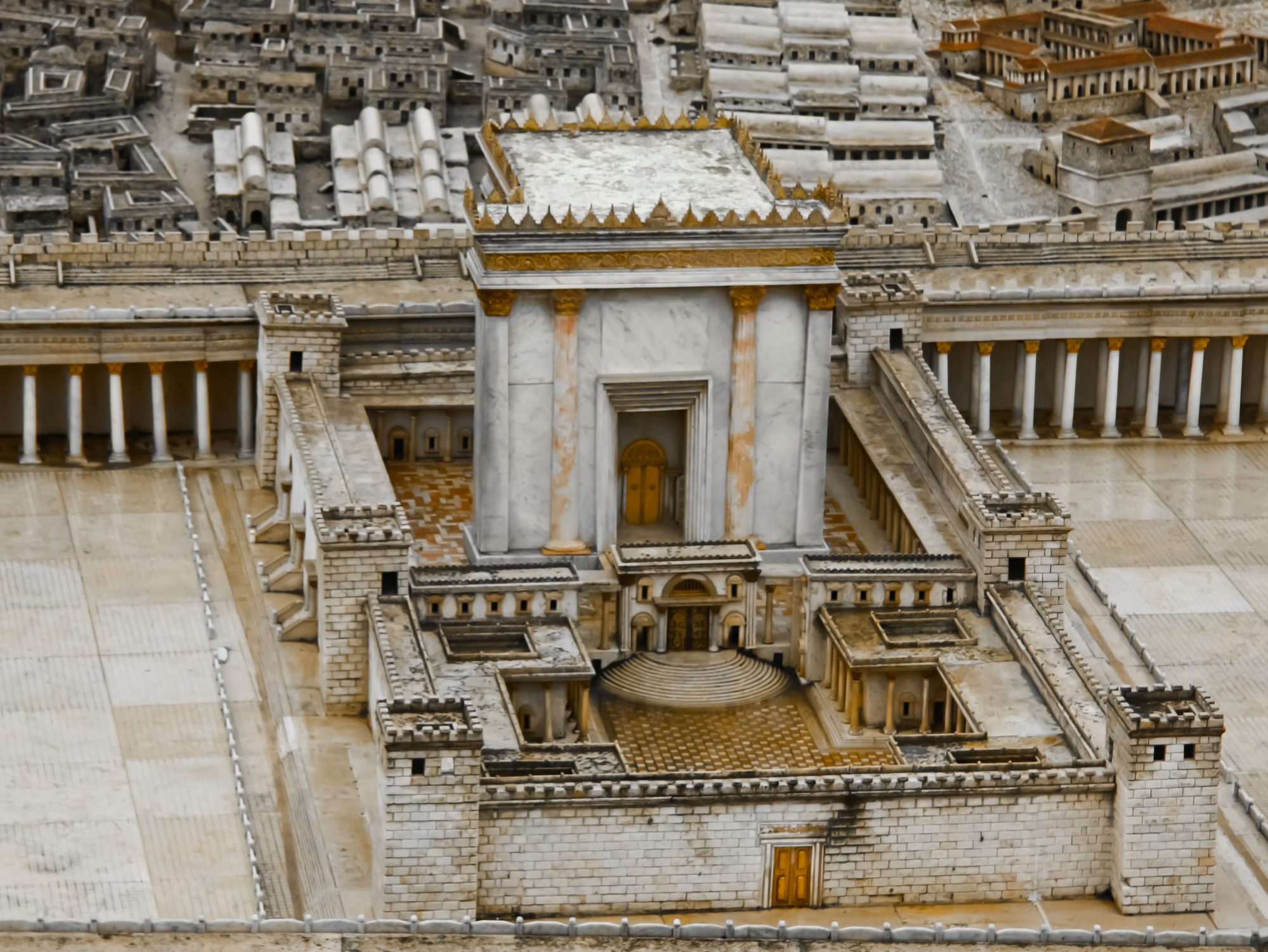God had said that when His people came into the Promised Land, He would choose a place where He would meet with them (Deuteronomy 12:5). David discerned that Jerusalem was the place, and he wanted to honor God by building a temple that would house the Ark of the Covenant. But God said to David, “[Your son] shall build a house for my name” (2 Samuel 7:13), and the privilege of building the temple fell to Solomon.
Time for the Temple
Normally, building sites echo with the sounds of cutting, hammering, and shouting, but the temple was put up in total silence. Every stone was cut and dressed in the quarry and then brought to the building site ready for assembly.
When all the materials were prepared, the command to build was given, and the temple went up in silence: “Neither hammer nor axe nor any tool of iron was heard in the house while it was being built” (1 Kings 6:7).
This picture is taken up in the New Testament, where God’s people are described as “living stones” (1 Peter 2:5). Everything that God is doing in your life is shaping you for your eternal destiny. Your pain and suffering are like the hammer and chisel, shaping you to be a living stone in God’s temple. When Jesus Christ returns, the preparation will be complete, and God’s people will be a glorious temple in which His presence dwells.
God’s Stonecutters
Some years ago, we had the opportunity of welcoming Romanian pastor, Joseph Ton, into our home for several days. He had been imprisoned for his faith, and we listened intently as he talked about the cost of his commitment to Christ.
He described how the prisoners hated the guards because of their cruelty, but Joseph prayed for them and for their families. When one of the guards asked him, “Why are you not filled with bitterness toward me?”
Joseph answered, “Because to me, you are God’s stonecutter.”
Who are God’s stonecutters in your life? They may have brought you pain, but God will use that pain to shape you into the likeness of Christ. God can also use difficult circumstances with your health, family, job, or finances to cut you into shape. The process is always painful, but when Christ returns you will be all that He calls you to be. And you will take your place in heaven where you will know and enjoy God’s presence forever.
A Service of Dedication
Once the building was complete, the people gathered for a service of dedication that proved to be one of the greatest occasions in the history of God’s people. When the priests brought the Ark of the Covenant into the Most Holy Place at the center of the temple, God’s presence came down: “A cloud filled the house of the LORD, so that the priests could not stand to minister because of the cloud” (1 Kings 8:10–11).
These people had never experienced the immediate presence of God. The last time God’s glory had shown itself like this was in the desert, more than four hundred years earlier. So Solomon had to explain to the people what was happening: “The LORD has said that he would dwell in thick darkness” (8:12).
The Most Holy Place at the center of the temple was a darkened room built to house the Ark of the Covenant. On the lid of the ark were golden figures of cherubim, representing the judgment of God. So when God’s presence came down, He broke through the separation represented by these figures and came among His people.
Responding with Worship
Solomon’s first response to the presence of God was to worship! “Blessed be the LORD, the God of Israel, who with his hand has fulfilled what he promised with his mouth to David my father” (8:15).
But Solomon knew that no building could ever contain God, and that the cloud of God’s presence could leave as quickly as it came. He longed for more than an occasional experience of God’s presence. He wanted the temple to be the place where God’s presence could always be found, so he made this request: “[May] your eyes… be open night and day toward this house, the place of which you have said, ‘My name shall be there’” (8:29).
Solomon also asked that God would hear the prayers of people living many miles from Jerusalem: “Listen to the plea of your servant and of your people Israel, when they pray toward this place. And listen in heaven your dwelling place, and when you hear, forgive” (8:30).
Joy filled Solomon’s heart as he anticipated a future blessed with the presence of God: “Blessed be the LORD who has given rest to his people… The LORD our God be with us, as he was with our fathers. May he not leave us or forsake us” (8:56–57).
The Sad Story of the Temple
But the joy did not last. After the time of Solomon, another king by the name of Manasseh promoted the worship of other gods and introduced astrology into God’s temple (2 Kings 21:5). This idolatry was so offensive to God that He gave His people into the hands of their enemies. The Babylonian army laid siege to Jerusalem, the city fell, and the temple was destroyed.
Jerusalem was reduced to a pile of rubble. In the process, the Ark of the Covenant was lost, and (despite the efforts of Indiana Jones!) it has never been found. This fact is of huge significance. Without the ark, the temple could no longer be the place where God meets with His people.
The temple was rebuilt under the leadership of Ezra and Nehemiah, but it was only a shadow of the one built by Solomon. People gathered for worship, but the cloud of God’s presence never came down. And by the time of our Lord Jesus Christ, the temple had become “a den of robbers” (Matthew 21:13).
The Temple with Us
Describing the birth of Jesus, John said, “The Word became flesh and dwelt among us” (John 1:14). Dwelt literally means “tabernacled,” or “pitched his tent,” so John is telling us that when Jesus was born the presence of God came down among His people.
Early in His ministry, Jesus came to the temple, and said, “Destroy this temple, and in three days I will raise it up” (John 2:19). Those who heard Him thought he was referring to the building, but Jesus was referring to His own body, indicating that He Himself is the place where we meet with God: “If you want to meet with God,” He was saying, “come to Me.”
The place where men and women can meet with God is not a building in Jerusalem or anywhere else. The place where you can meet with God is through Jesus Christ. Solomon asked that God would listen to the prayers that were directed toward the temple, but Jesus promises that God will hear prayers that are offered in His name: “Whatever you ask of the Father in my name, he will give it you” (John 16:23).
The Spirit in Us
When the disciples were with Jesus, they had open access to the presence of God. God was with them in the person of Jesus, so when Jesus began to speak about leaving, the disciples were troubled.
But Jesus said, “I will ask the Father, and he will give you another Helper, to be with you forever, even the Spirit of truth… for he dwells with you and will be in you. I will not leave you as orphans; I will come to you” (John 14:16–18). The disciples had known the presence of God with them in Jesus, but now they would know the presence of God in them by the Holy Spirit.
The gift of the Holy Spirit in the life of the believer is so astonishing that Paul asks, “Do you not know that your body is a temple of the Holy Spirit within you?” (1 Corinthians 6:19). Try to take this in: That is why Paul prays that believers will “know the love of Christ that surpasses knowledge, that you may be filled with all the fullness of God” (Ephesians 3:19).
The whole of human history is leading up to the day when Jesus Christ will take His people into the immediate presence of God. The apostle John was given a glimpse of what this will be like. He saw a great city and a great crowd of people. Then he heard “a loud voice from the throne saying, ‘Behold, the dwelling place of God is with man. He will dwell with them, and they will be his people, and God himself will be with them as their God’” (Revelation 21:3).
Opened
The cloud of God’s presence in the temple pointed forward to what God would do in Christ. God took human flesh and came down among us in Jesus. When we believe in Him, God’s presence enters our lives by the Holy Spirit, giving us a foretaste of the joys that lie ahead when we will live with Him forever.






